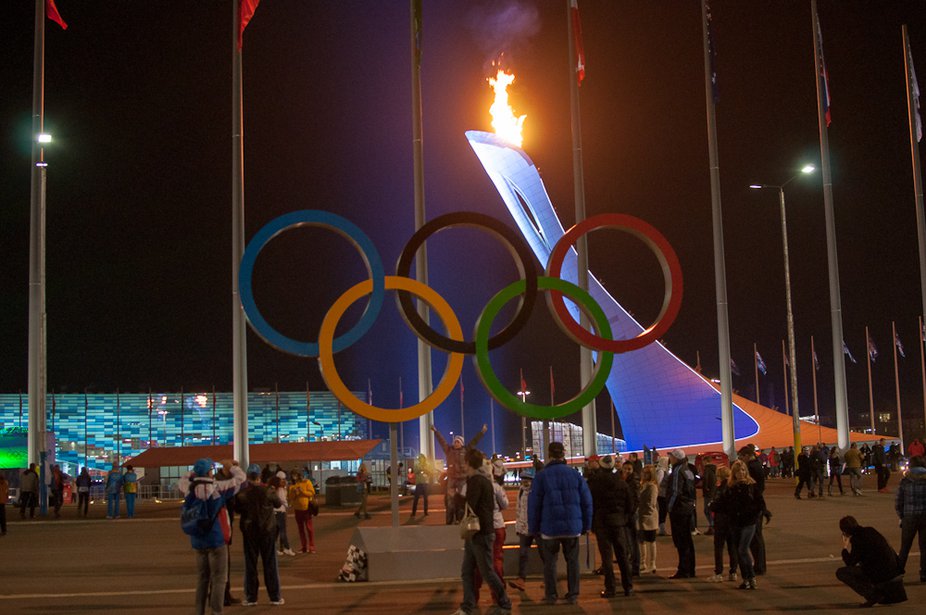
Two sides of the same coin. The facade...
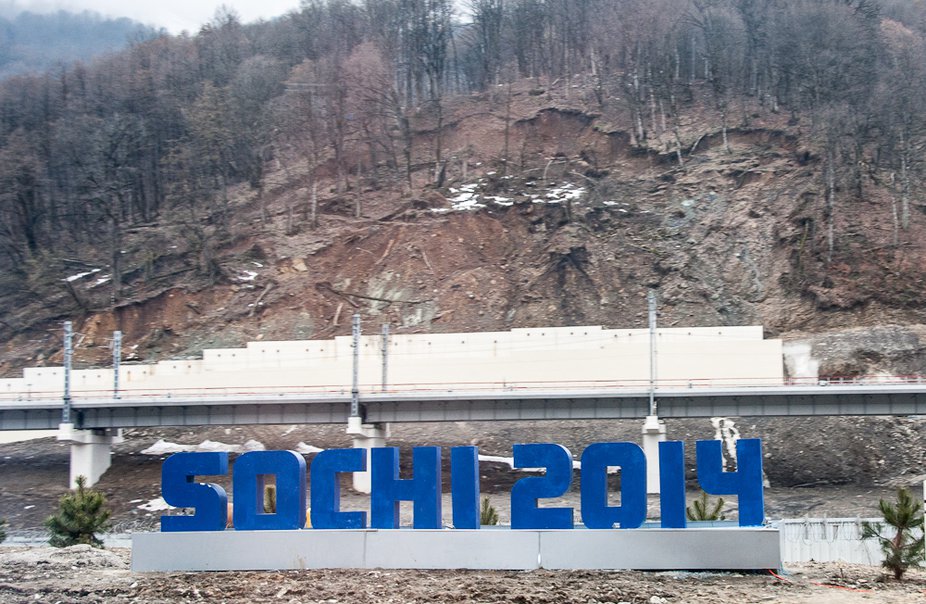
...and the reality.
Words & photos: Ethan Stone
The XXII Winter Olympic Games in Sochi have just ended, but the question remains: How will they be remembered? And what did they mean for park skiers?
On the one hand, the expectations for these Games were historically low, and the organizers succeeded in surpassing them. No bombs went off, relatively few people were beaten on camera (besides Pussy Riot), and all the sporting events went off with nary a hitch. Many will chalk this up as a success for Russia and its patriarch, Vladimir Putin, who hoped to show the world the "new face of Russia" with these Games.
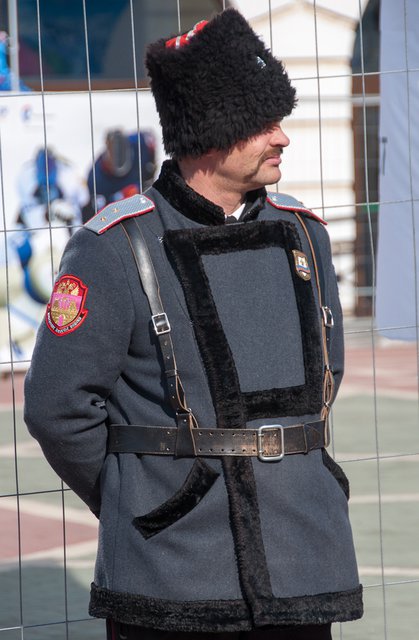
Nice moustache on the faux security...
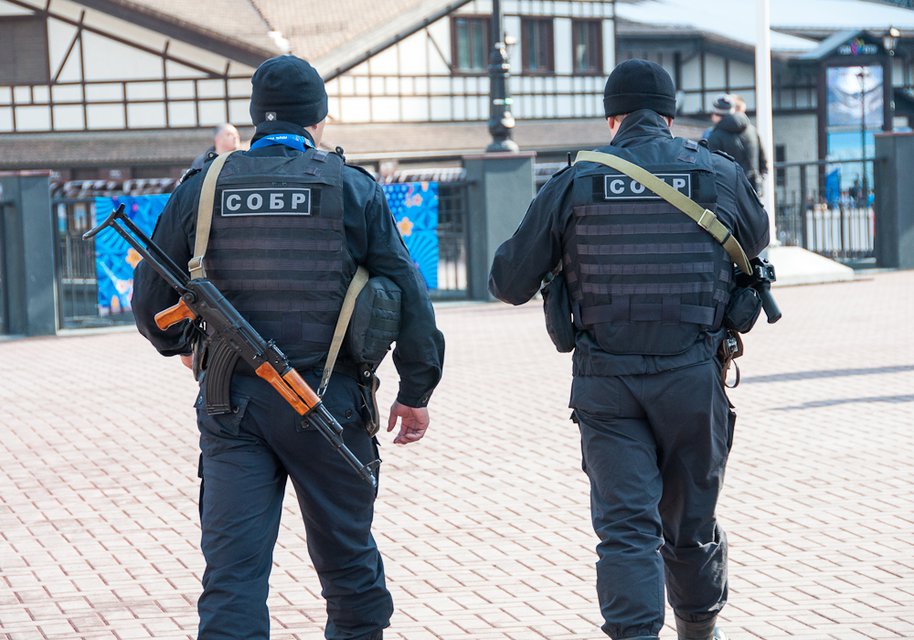
...and less entertaining accessories on the real security.
On the other hand, the successful execution of the Olympic Games does not eclipse the disastrous preparations, the questionable means, and the abuses by which the event was finally brought to fruition. The ends do not justify the means.
Two weeks ago I arrived in Sochi to report on the Games for Newschoolers. Immediately I was introduced to the concept of "the Sochi bubble." Inside the bubble, everything is fine and happy, the Olympic spirit reigns, and the focus is on sports—-not human rights, corruption, or the environment.
Although I got the stamp in my passport, I was never really in "Russia." The Sochi that I visited was not the Sochi that existed before the Games, and it is most certainly not the Sochi that will exist when the Games are over and everyone has gone home.
The place that I visited was a facade: a well-engineered show with lots of bright banners obstructing anything that was unsightly or unseemly, and lots of friendly, smiling volunteers to point you in the right direction and keep you on the authorized pathway.
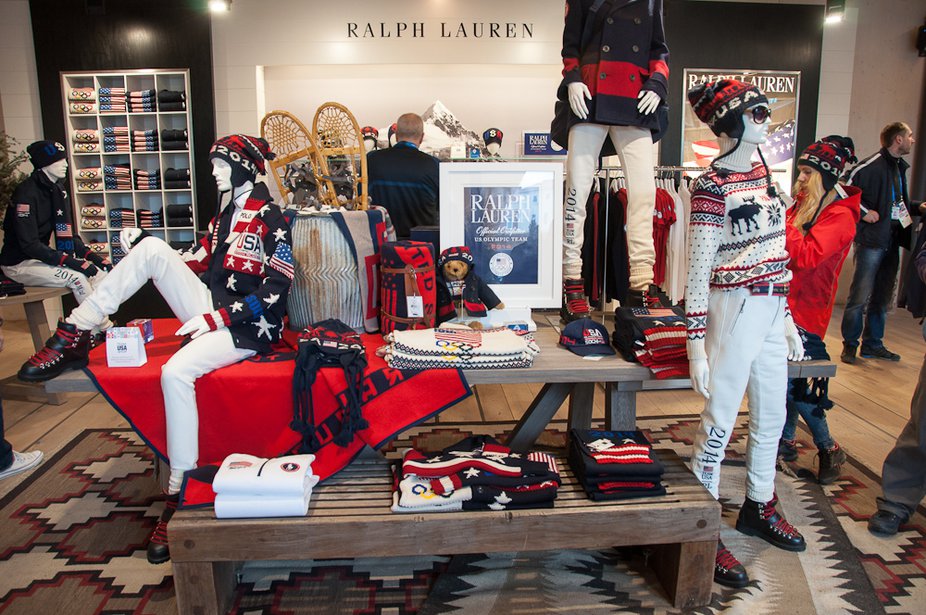
American capitalism alive and well in Russia. This is the Team Shop in the USA House.
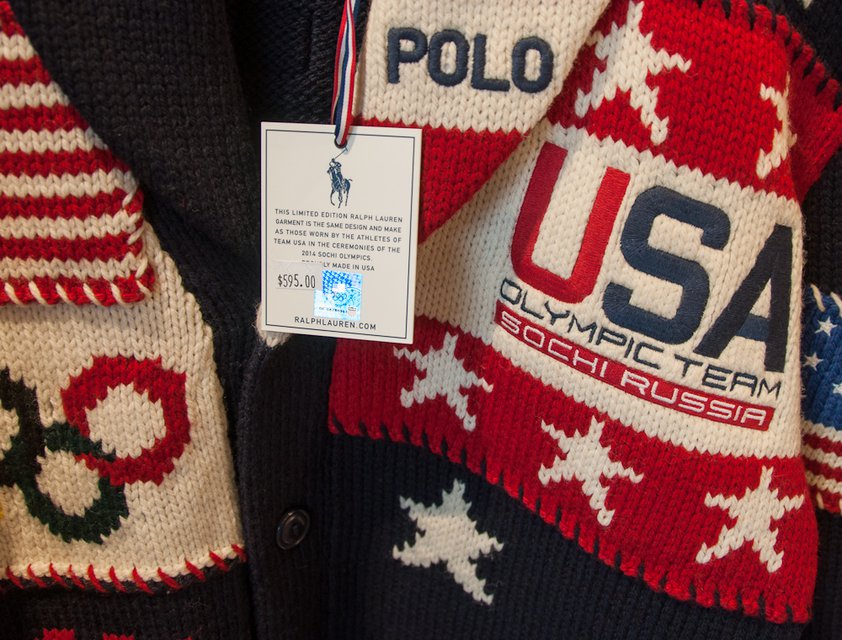
Want to buy one of those ugly Opening Ceremony cardigans for grandma? Check the price tag first.
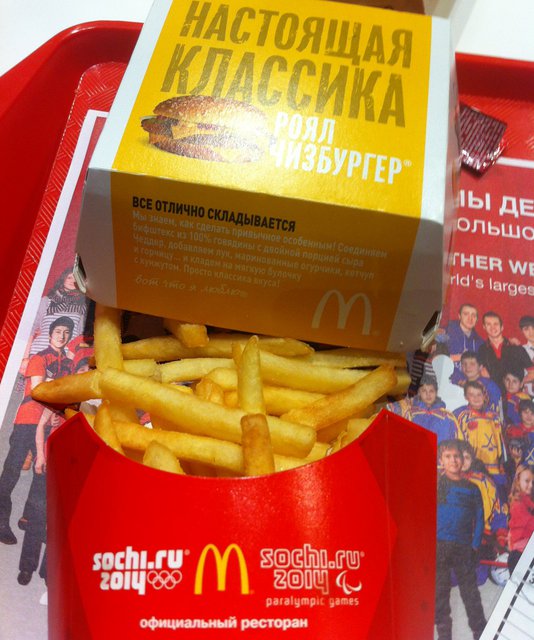
Some local flavor in the Mountain Cluster...

More local flavor: Russian Subway!
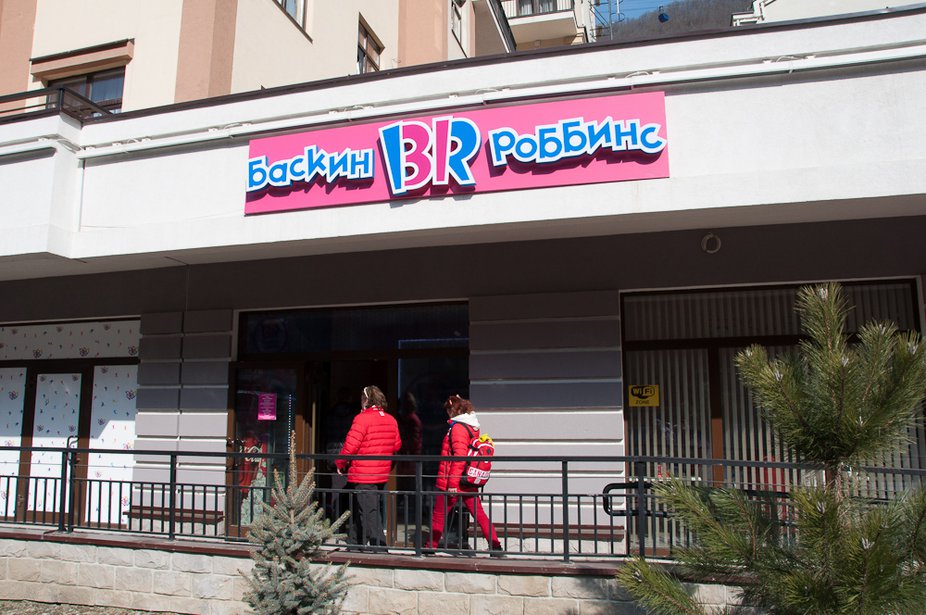
An athlete favorite in the Mountain Cluster: Baskin Robbins!
But the magnitude of mismanagement at these Olympic Games is impossible to cover up even if you're using a few thousand miles' length of bright blue "Sochi 2014" banners and the loudest volunteer jackets imaginable. The valley of the Myzmta River, home to the Olympic Mountain Cluster, is a full-fledged environmental catastrophe. The landscape there has been utterly demolished in the building frenzy leading up to the Olympics, a frenzy that has succeeded in producing erosion-threatened slopes, exorbitantly unsustainable building facilities, brand-new hotels that are already collapsing, and a nine-billion-dollar highway that will be threatened by floodwaters in years to come.
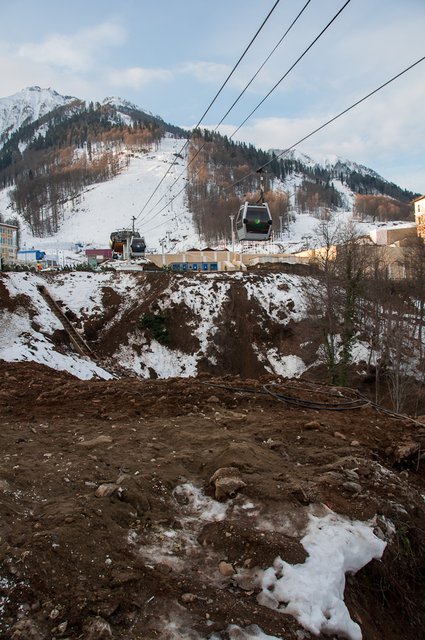
Gorky Village was still half-finished when the Games began.
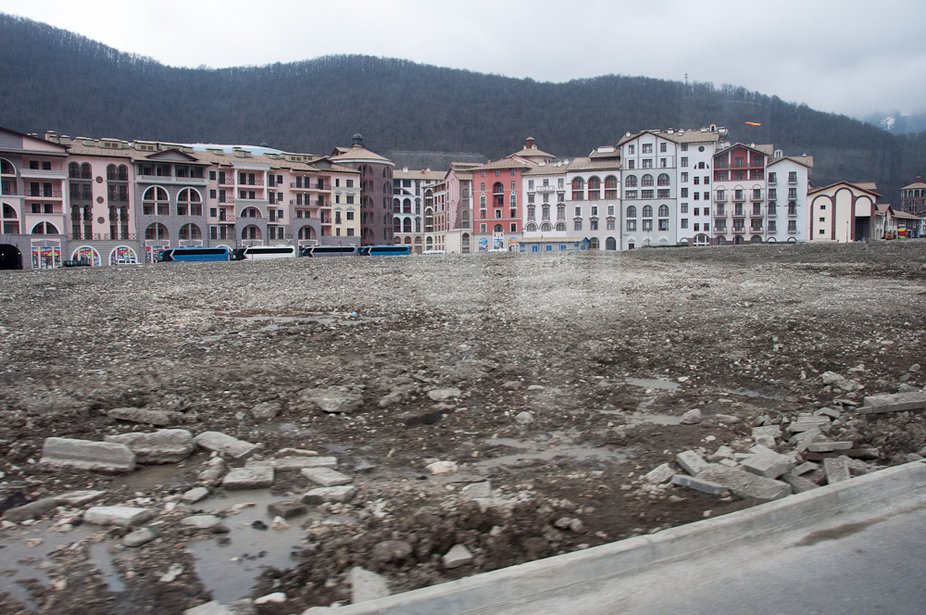
Nice views from the Mountain Cluster hotels.
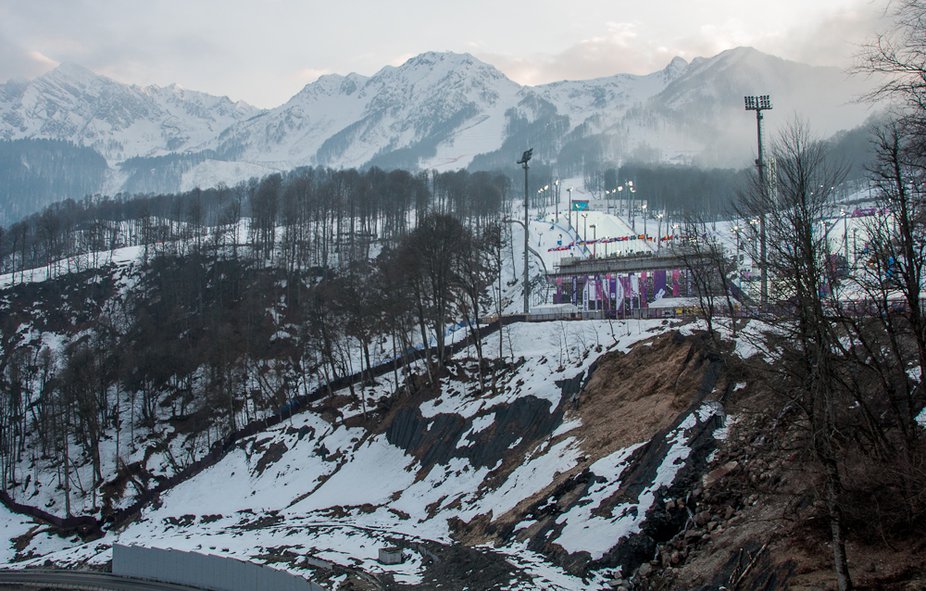
A different perspective of Rosa Khutor and the halfpipe venue.
In the mountain cluster the Sochi 2014 facade was particularly thin. The hotels that were completed on time stand next to abandoned lots scattered with rubble. The finished hotels themselves, pristine at first glance, quickly betray their flimsy construction: water pipes bursting, elevators broken, stairways collapsing, lights and electrical systems nonfunctional-—in short, last-minute jobs done by poorly paid (or in some cases, not paid at all) workmen, employed by developers skimming money off the top, frantically trying to get the job done by the Olympics or else face Putin's wrath.
These Games were held together by spit and the Russian equivalent of duct tape: brute force.
Sinking Stones
The best example I can find to describe the infrastructure of the Mountain Cluster is the plaza in front of my hotel, which was paved with paving stones. Normally, paver blocks are placed on top of a compacted gravel substrata that supports the finished product and keeps the pavers even.
These blocks, however, were placed directly onto the mud of the hillside. Every day they sank into the earth, creating depressions in the plaza. One day a small sinkhole a few feet in diameter opened up--a little hole in front of the hotel four feet deep that hadn't been there the night before.
Every day, a crew of workmen arrived and repaired the damaged areas; not by adding a proper foundation and creating a permanent fix, but by removing the affected stones, shoveling dirt into the depressions to even them out, and replacing the stones again.
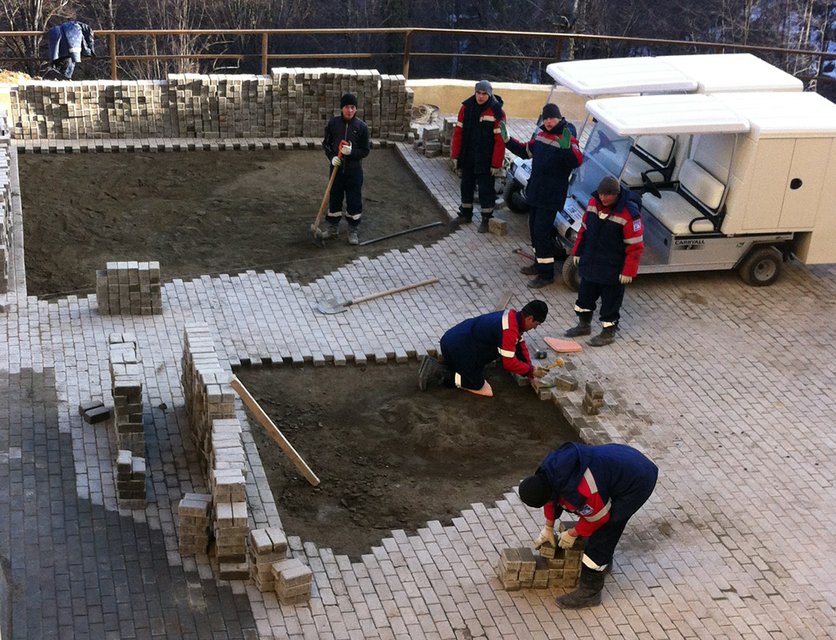
Rebuilding the plaza for the fifth time.
Over the twelve days that I stayed at the hotel, I watched this process happen at least eight times. Each morning the stones of the plaza would be rippled and uneven, the work crew would repair them, and in the evening the plaza would be even again. The next morning, the stones had sunk again, and the work crew would arrive to fix them again.
This happened over and over and over again, and apparently nobody thought about taking the time to pull up all the stones, put down a proper foundation, and build the plaza in a manner that would allow it to exist for more than 24 hours at a time. But the goal was not to build something properly, but to perform the bare minimum effort to maintain the facade, the illusion of a fancy slopeside hotel that will still be standing here six months from now.
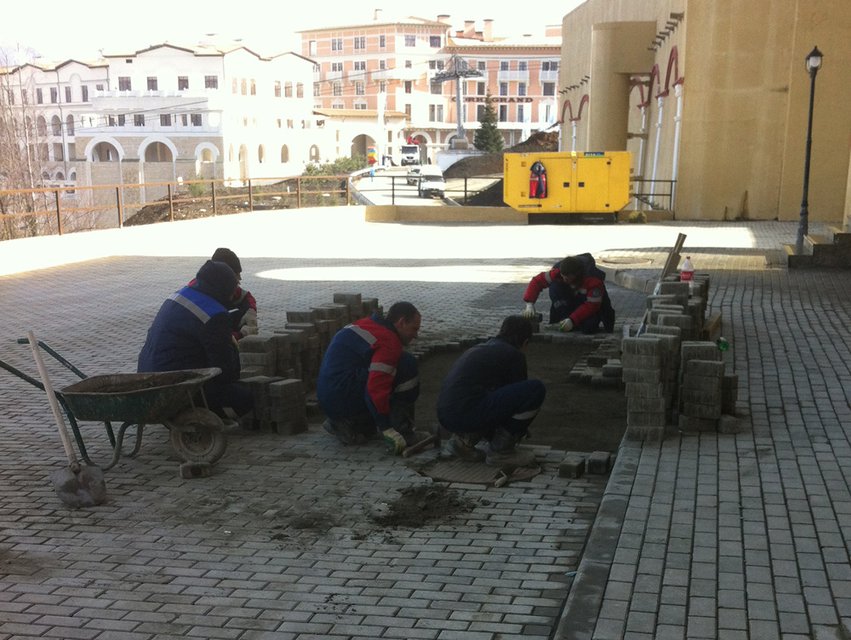
Rebuilding the plaza for the eighth time.
The plaza in front of the hotel is surely the smallest and most insignificant detail in the grand scope of the Olympics, but I think it's a telling example of how this place was converted practically overnight from a quiet mountain valley into an Olympic venue: by building too fast on a poor foundation. I fear that everything else in this valley was built in exactly the same manner.
So what will happen when the Games are over and the workers stop coming every day to maintain the facade? The answer is simple: it will collapse.
Putin's goal was to turn this valley into a world-class ski destination, a place where the Russian aristocracy and the international jet-set convene for their posh winter vacations; a Russian Chamonix, St. Anton or Kitzbühel. There's no doubt that the mountains here have the potential; they are huge, steep, and awesome. I would do heinous things to ski a big storm here.
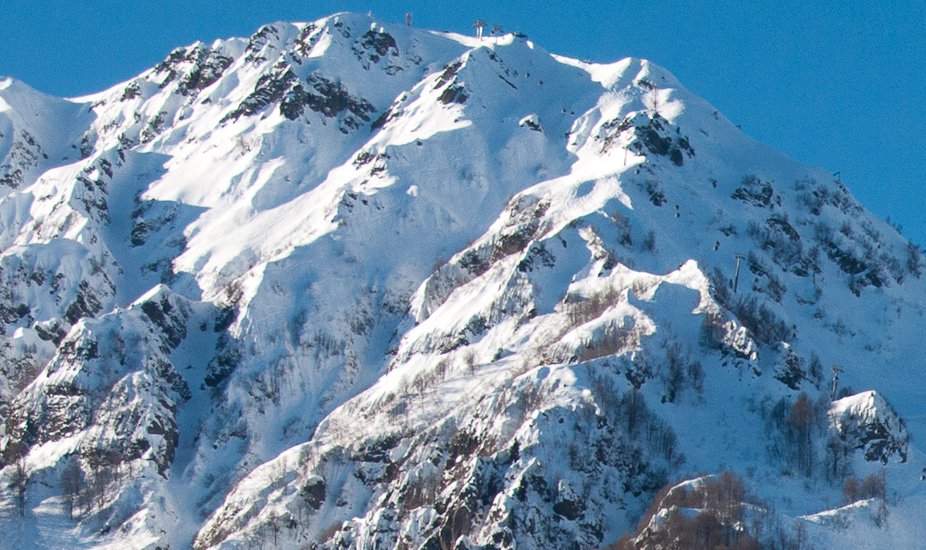
Serious alpine terrain at Rosa Khutor. Which line would you ski?
But for a place to become a Chamonix, St. Anton or Kitzbühel requires decades of persistent investment, repeat visits by millions of convinced tourists, and a lot of good PR, and Sochi has none of the three. The money will dry up after the Games, and sadly, Putin's bid to charm the world in Sochi has fallen flat on its face. The Sochi Games have become little more than a laughingstock to the rest of the world, and few people from outside Russia will come here afterwards.
Sochi is already well-known in Russia as a summer vacation destination, but only for the well-heeled. One volunteer, Masha, told me that it's cheaper for a Russian family to fly to Turkey on vacation than to come to Sochi.
I would highly recommend this place to any freerider. The rooms will be cheap and plentiful, the skiing is all-time, and once the artificial Olympic culture has been packed up, you might even encounter some authentic local culture. But unless some unforeseen miracle takes place, the mountains of Sochi will never become the international ski destination that they were intended to be. And it's a real shame that the astronomical costs of these Games, financial as well as human, will be for nothing in the end.
On the positive side
Do not allow my criticism of the infrastructure in Sochi to tarnish the reputation of the people here. With extremely few exceptions, the Russian people I met in Sochi were warm, friendly, outgoing and welcoming to Olympic visitors. This is truly astonishing considering the manner in which so many of the foreign visitors behaved towards the locals. I witnessed countless occasions in which foreigners were rude, disdainful and arrogant towards Russians, and I count it as a true sign of character that so many received this treatment with a shrug and a smile.
The Games were meant to open Russia to the world, but many who visited Sochi arrived with their hearts and minds already closed. Persistent stereotypes dating from the Cold War, combined with the negative press free-for-all preceding the games, had already poisoned the minds of many before they even touched down in Sochi.
Here's a quick message to any Westerner traveling abroad in the future: Don't expect the people there to speak your language or know your customs. Don't expect things to work the way they do at home. If you get upset when someone doesn't understand you, it's not because they're an idiot who doesn't speak English. It's you who are the idiot who expects them to.
Understandably, many arrived here in Sochi expecting an Olympic standard, whatever that might be, and in many respects they were let down. In my mind, that's their own damn fault. Anyone who ventured to Sochi thinking that it would be like Vancouver, Torino, or Salt Lake was sadly mistaken.
Freeskiing's Debut
The disciplines of ski halfpipe and slopestyle certainly picked a unique Olympic Games for their debut on the world stage. Thankfully all four freeskiing events went off without any major problems, and our athletes succeeded in impressing everyone in attendance and presenting our sport the way it needed to be shown: fun, badass, and more than a little irreverent.
The men and women of freeskiing had their ups and downs at the Games. Some tasted victory, and others the agony of defeat. Some went home with medals, others with blown knees (Lyman Currier) and broken jaws (Yuki Tsubota). Some complained about the venues, others sent it without a second look.
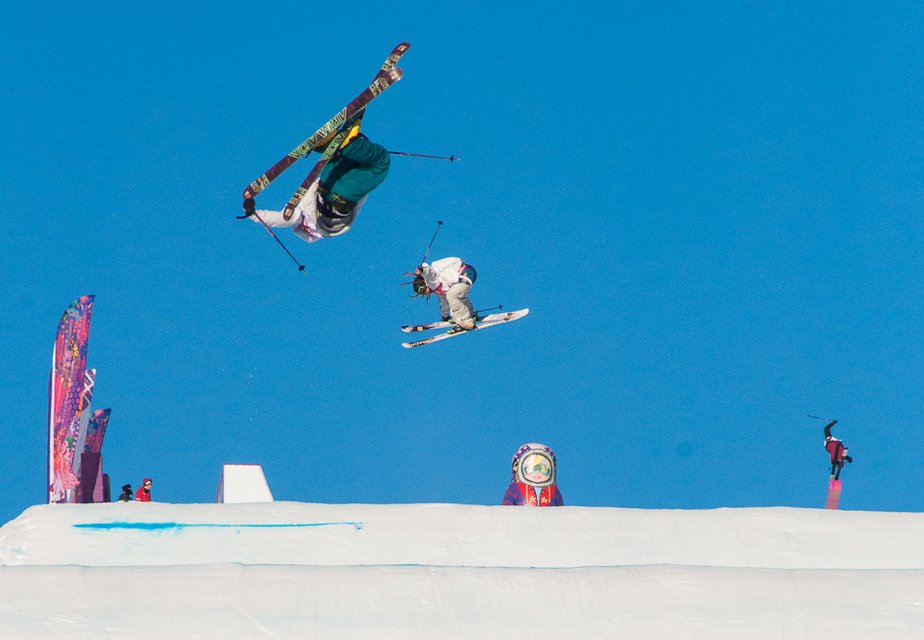
The Olympics have never seen anything like this before...
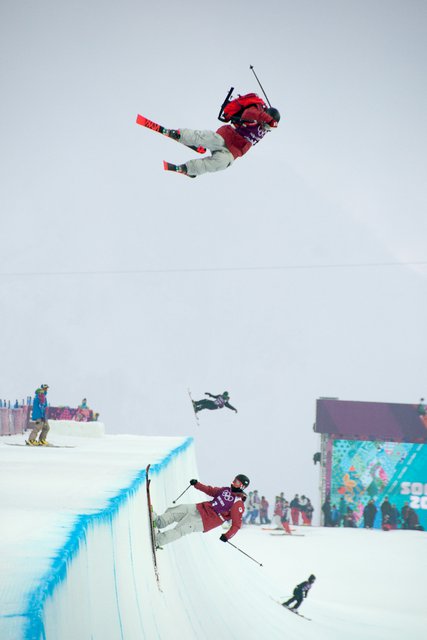
...or like this. No fucks given by Matt Margetts.
One of my goals in Sochi was to gauge the response of the public to ski halfpipe and slopestyle, and I can report that that response was overwhelmingly positive. Many people I talked to didn't even know that ski pipe and slope were new Olympic events--they just saw them on the program and took for granted that these disciplines are "Olympic."
Let's face it: a lot of so-called Olympic sports are boring, stupid pursuits that nobody does for fun and nobody pays any attention to except for once every four years. Pipe and slopestyle, on the other hand, are vibrant, flourishing sports that aren't just performed in World Cup venues, but at ski areas worldwide, by amateurs as well as professionals. This kind of energy and excitement--to see somebody participating in an Olympic sport and actually HAVING FUN--was something new at the Games, and something that was very well received.
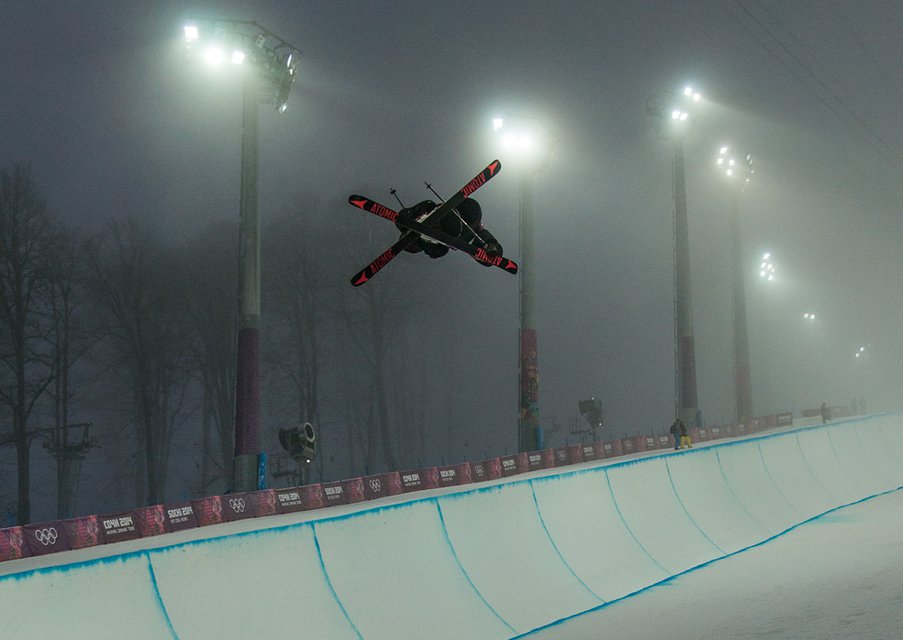
Jossi Wells gets my vote for the most stylish rider of the Olympics, from the pipe to the slope course, Jossi laid it down smooth.
Still, people didn't quite know what do with park skiers. One Russian volunteer told me, "They don't look like athletes," and this is true in the sense that they don't look like intense, victory-focused maniacs in spandex suits. The slope and pipe skiers didn't fit the appearance of typical Olympic athletes, and many viewers had a more difficult time appreciating their athleticism because of this. Just look at the focus on Henrik's pants instead of on his skiing.
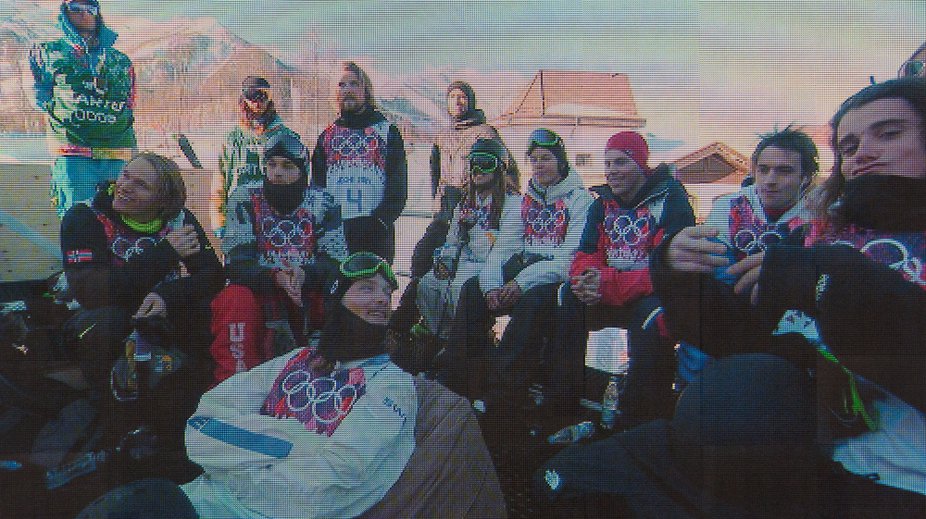
Athletes chilling together at the top of the course? How un-Olympic. These guys are supposed to be as good of friends as Tonya Harding and Nancy Kerrigan.
Another journalist told me, "It seems like they don't care that much about winning medals," and this is also true. While an Olympic medal is certainly a dandy feather to have in one's cap, nobody got into park skiing because they wanted to win gold in the Olympics. (Although I did hear that a few of the pipe competitors only started skiing pipe when pipe went Olympic). With few exceptions, the freeski athletes were very stoked to be there and do their best, and certainly many of them are very competitive--but at the end of the day, very few park skiers have the same drive and expectations placed on them to win as, say, an alpine racer or a figure skater.
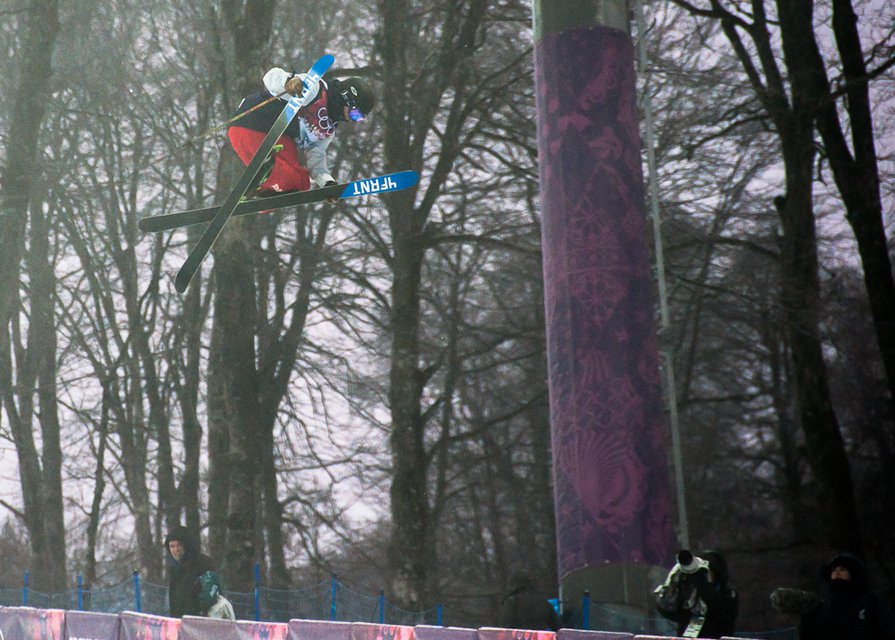
David Wise was an unstoppable force in the halfpipe last week.
That's not to say that this won't change. Four years from now we'll see many more park and pipe skiers who ski to win instead of for fun, who have the pressure of their national Olympic committees and their country's media pushing them to perform.
All in all, I don't think that the Olympic debut of Freeskiing was as catastrophic as many of us predicted it would be. The judges had a clue, were well aware of the mistakes made in the past that killed the progression of moguls and aerials, and overall did an admirable job of staying true to freeskiing's soul by awarding originality and creativity.
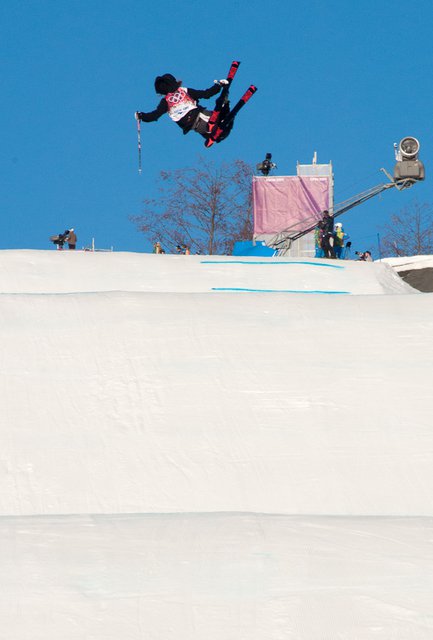
Beau-James Wells with a "little" safety tweak.
Our skiers got the media attention they deserve (if mogulists, bobsledders, figure skaters and curlers deserve it, then we certainly do too), our sport picked up a few million new fans, and the members of our tribe got to swap bodily fluids in the Olympic Village. Henrik's now being followed on Twitter by most of the Wu-Tang clan, Torin Yater-Wallace got Taylor Swift's attention (and hopefully a new McDonald's sponsorship), and Gus charmed millions with his stray puppy photos.
The Olympics have become another driver for halfpipe and slopestyle competition, like the X Games have been for years already, but on a global scale that dwarfs ESPN's pet project. The Games won't be as relevant as X is year-for-year, but every four years, you can expect the big five-ringed circus to come around, and sure as shooting, we're now a part of it.
In the end, whether you think that's a good thing or not is really up to you.
Related articles:
Sochi from the Inside: http://www.newschoolers.com/membernewsread/44438/Sochi-From-the-Inside
Women's Slopestyle Recap:http://www.newschoolers.com/readnews/44454/Olympic-Slopestyle-Redeemed] http://www.newschoolers.com/readnews/44454/Olympic-Slopestyle-Redeemed[/url]
Men's Slopestyle Recap: http://www.newschoolers.com/readnews/44479/A-Day-to-Remember-in-Sochi
A Ski Day In Sochi:http://www.newschoolers.com/readnews/44509/A-Ski-Day-in-Sochi] http://www.newschoolers.com/readnews/44509/A-Ski-Day-in-Sochi[/url]
Men's Halfpipe Recap:http://www.newschoolers.com/readnews/44573/How-I-Almost-Got-Thrown-Out-of-Halfpipe-Finals?c=1&o=2] http://www.newschoolers.com/readnews/44573/How-I-Almost-Got-Thrown-Out-of-Halfpipe-Finals?c=1&o=2[/url]
Women's Halfpipe Recap: http://www.newschoolers.com/readnews/44611/Sarah-Burke-Is-the-True-Winner-of-Women-s-Ski-Halfpipe-in-Sochi?c=latest&o=2&page=1

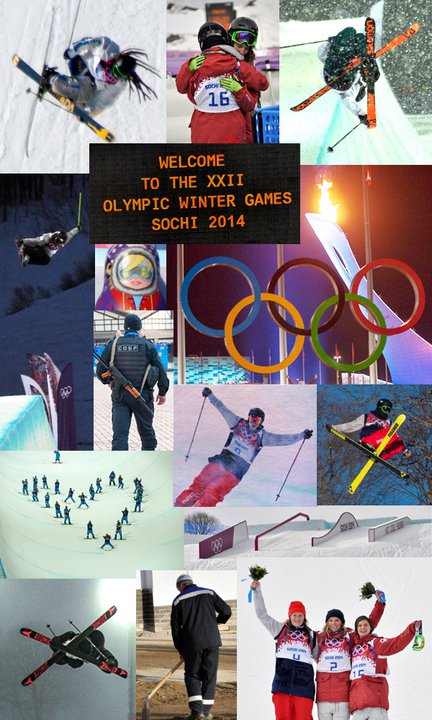
Comments